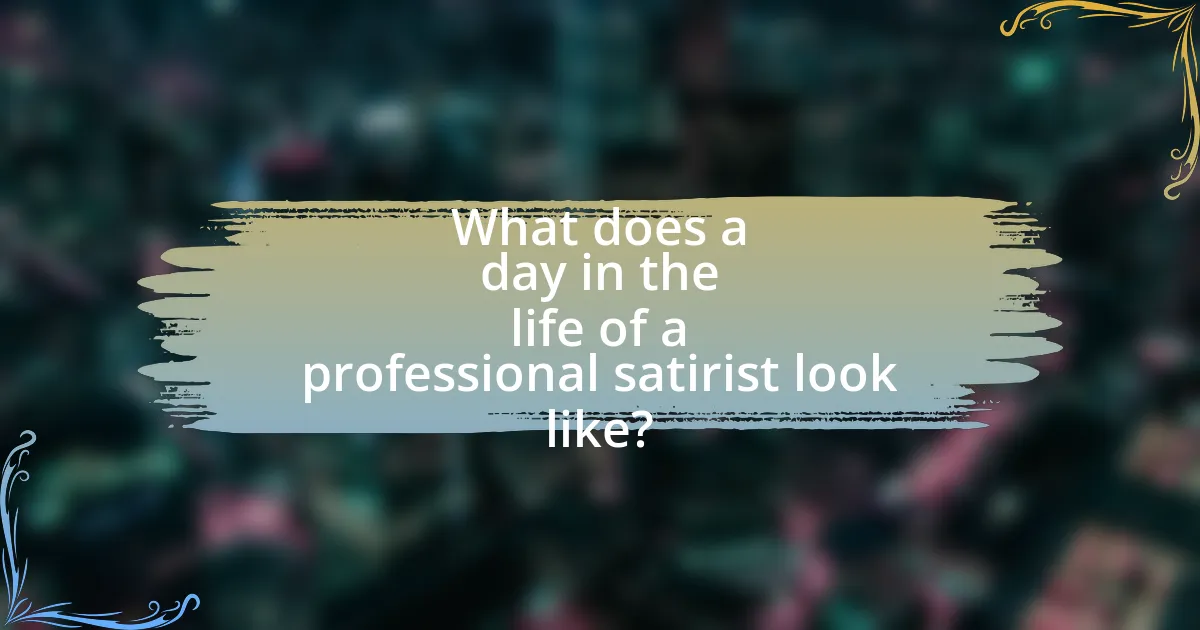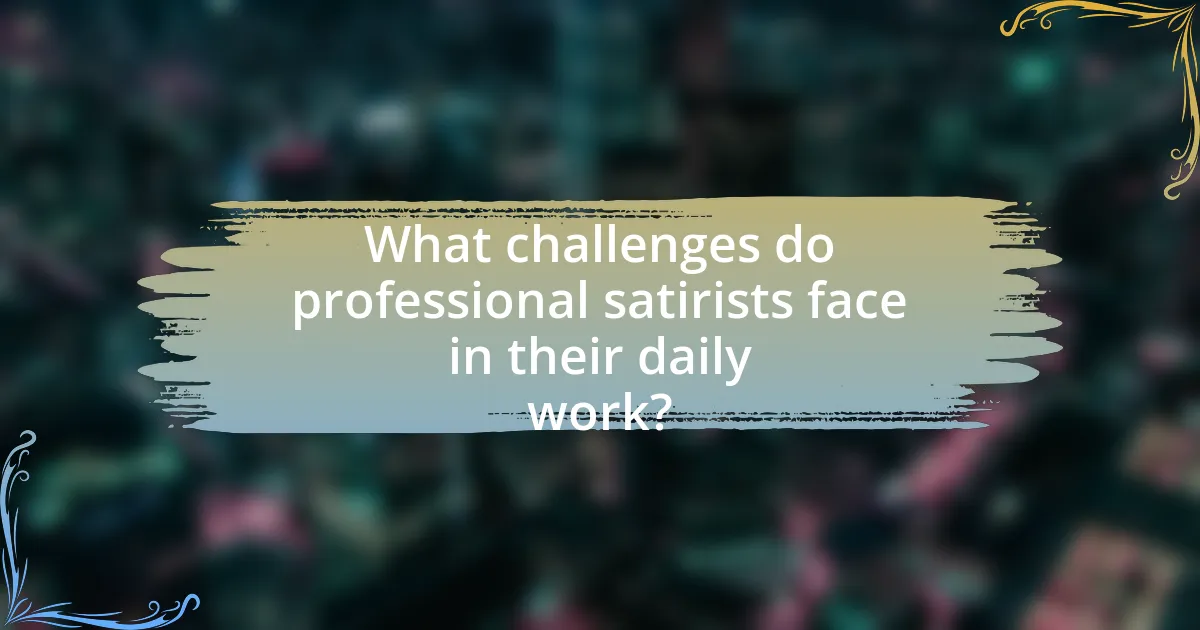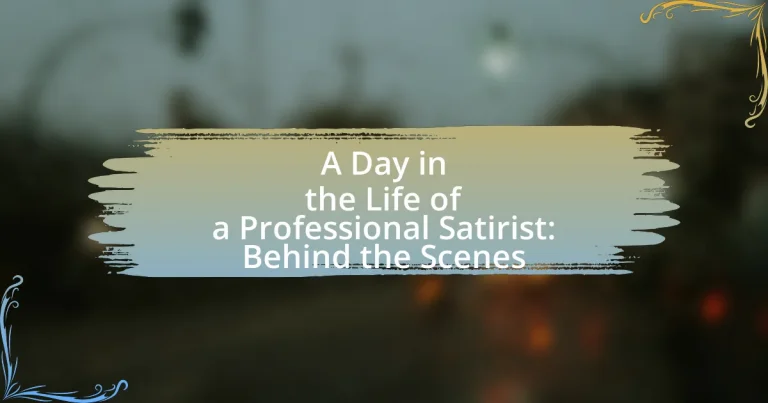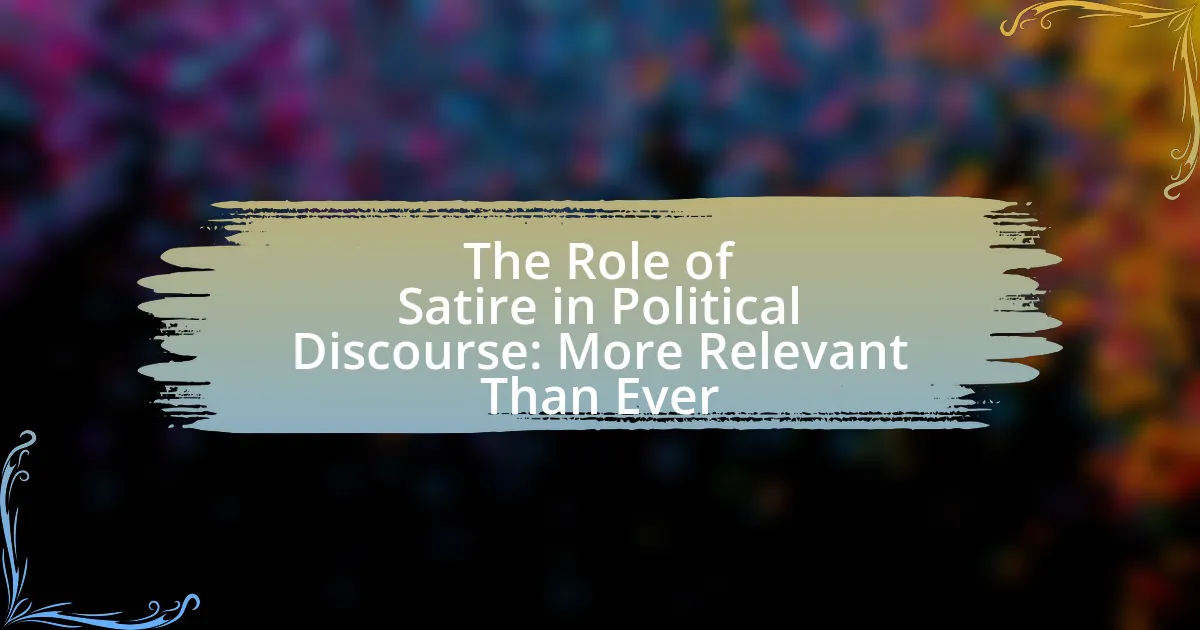The article explores the daily routine of a professional satirist, detailing the essential tasks and processes involved in their work. It highlights the importance of research, writing, and performance, emphasizing how satirists stay informed about current events to create relevant content. Key aspects such as morning routines, collaboration with peers, and the challenges faced in balancing humor with sensitivity are discussed. Additionally, the article examines the skills necessary for effective satire, including observational skills, wit, and an understanding of social issues, while also addressing the ethical considerations that guide a satirist’s creative choices.

What does a day in the life of a professional satirist look like?
A day in the life of a professional satirist involves a blend of research, writing, and performance. Typically, the satirist begins the day by consuming news and media to identify current events and societal issues that warrant satire. This research phase is crucial, as it informs the satirist’s perspective and helps in crafting relevant material.
Following the research, the satirist dedicates time to writing, where they develop scripts, sketches, or articles that incorporate humor and critique. This writing process often includes multiple drafts and revisions to ensure the satire is sharp and impactful.
In addition to writing, a professional satirist may spend part of their day rehearsing for performances, whether for live shows, television, or online platforms. This rehearsal is essential for timing and delivery, which are critical in satire to maximize comedic effect.
Networking and collaboration with other writers, comedians, or producers also play a significant role in a satirist’s day, as these interactions can lead to new ideas and opportunities.
Overall, the daily routine of a professional satirist is dynamic and requires a keen awareness of cultural and political landscapes, strong writing skills, and the ability to engage an audience effectively.
How do professional satirists start their day?
Professional satirists typically start their day by consuming news and current events to gather material for their work. This involves reading newspapers, watching news broadcasts, and browsing social media platforms to identify trending topics and public sentiments. By staying informed, satirists can pinpoint absurdities and inconsistencies in societal issues, which serve as the foundation for their satire. This practice is essential, as it allows them to create relevant and timely content that resonates with their audience.
What morning routines do satirists follow to inspire creativity?
Satirists often engage in specific morning routines to inspire creativity, including reading news articles, practicing mindfulness, and brainstorming ideas. Reading current events helps satirists identify relevant topics and societal issues to satirize, while mindfulness practices, such as meditation or journaling, can enhance focus and clarity of thought. Additionally, brainstorming sessions allow satirists to explore various angles and perspectives on a subject, fostering innovative ideas. These routines are supported by the understanding that a structured morning can lead to increased productivity and creativity, as noted in studies on creative processes and daily habits.
How do current events influence their daily schedule?
Current events significantly influence a professional satirist’s daily schedule by dictating the themes and topics they address in their work. For instance, when major political events or social issues arise, satirists often prioritize these subjects to remain relevant and engage their audience effectively. This responsiveness is crucial, as timely commentary can enhance the impact of their satire, making it more relatable and poignant. Research indicates that satirists who align their content with current events tend to achieve higher audience engagement and social media shares, demonstrating the importance of adapting their schedules to reflect the news cycle.
What are the key tasks a satirist engages in throughout the day?
A satirist engages in several key tasks throughout the day, primarily focusing on research, writing, and performance. Research involves staying updated on current events, cultural trends, and political issues to identify topics ripe for satire. Writing includes crafting jokes, sketches, or scripts that effectively convey humor while critiquing societal norms or behaviors. Performance tasks may involve rehearsing material, performing live, or recording content for various media platforms. These activities are essential for producing relevant and impactful satirical work that resonates with audiences.
How do satirists research topics for satire?
Satirists research topics for satire by analyzing current events, social issues, and cultural trends. They often consume a wide range of media, including news articles, social media, and academic studies, to identify subjects that resonate with audiences. For instance, satirists may examine political speeches or public reactions to controversial events to find material that highlights absurdities or contradictions. This method is supported by the fact that successful satire often reflects the zeitgeist, making it relevant and impactful.
What writing techniques do satirists employ to craft their material?
Satirists employ techniques such as exaggeration, irony, parody, and juxtaposition to craft their material. Exaggeration amplifies characteristics or behaviors to highlight absurdities, while irony creates a contrast between expectations and reality, often revealing hypocrisy. Parody mimics the style of a subject to critique it, and juxtaposition places contrasting ideas side by side to emphasize differences. These techniques are effective in conveying social commentary and provoking thought, as seen in works like Jonathan Swift’s “A Modest Proposal,” which uses irony and exaggeration to critique societal issues.
How do professional satirists collaborate with others?
Professional satirists collaborate with others through brainstorming sessions, scriptwriting partnerships, and feedback exchanges. These collaborations often involve working with writers, comedians, and producers to refine ideas and enhance comedic impact. For instance, shows like “Saturday Night Live” exemplify this collaborative process, where teams of writers contribute diverse perspectives to create sharp, timely satire. This teamwork allows satirists to blend various styles and insights, resulting in more nuanced and effective commentary on social and political issues.
Who do satirists typically work with in their creative process?
Satirists typically work with writers, editors, and performers in their creative process. These collaborators contribute to the development of satirical content by providing diverse perspectives, refining ideas, and enhancing the delivery of humor. For instance, writers may brainstorm concepts, while editors ensure clarity and impact, and performers bring the satire to life through acting or presentation. This collaborative approach is essential for creating effective satire that resonates with audiences.
What role does feedback play in refining their work?
Feedback plays a crucial role in refining the work of a professional satirist by providing insights into audience reception and effectiveness of the satire. This input allows the satirist to identify strengths and weaknesses in their material, enabling them to make necessary adjustments for clarity, humor, and impact. For instance, constructive criticism from peers or audience reactions can highlight which jokes resonate and which fall flat, guiding the satirist in honing their craft. Research indicates that feedback mechanisms significantly enhance creative processes, as seen in studies on collaborative writing and performance arts, where iterative feedback loops lead to improved outcomes.

What challenges do professional satirists face in their daily work?
Professional satirists face several challenges in their daily work, including balancing humor with sensitivity, navigating political correctness, and dealing with audience backlash. The need to create content that is both funny and thought-provoking often leads to the risk of offending individuals or groups, which can result in public criticism or loss of audience. Additionally, satirists must stay informed about current events and cultural trends to ensure their work remains relevant, which can be time-consuming and stressful. The landscape of social media also complicates their work, as rapid dissemination of content can lead to misinterpretation or misrepresentation of their satire, further complicating their ability to communicate effectively.
How do satirists handle criticism and backlash?
Satirists handle criticism and backlash by employing humor and irony to deflect negativity while often engaging in dialogue about the issues they satirize. They may acknowledge criticism publicly, using it as an opportunity to clarify their intent or to further their commentary on societal norms. For instance, satirists like Jon Stewart and John Oliver have faced backlash but have used their platforms to address criticisms directly, often incorporating them into their material to highlight the absurdity of the backlash itself. This approach not only mitigates the impact of criticism but also reinforces their role as social commentators, demonstrating that satire can provoke thought and discussion even in the face of opposition.
What strategies do they use to cope with negative reactions?
Professional satirists cope with negative reactions by employing strategies such as reframing criticism, seeking support from peers, and maintaining a strong sense of humor. Reframing criticism allows them to view negative feedback as an opportunity for growth rather than a personal attack, which is essential in a field that often invites controversy. Seeking support from fellow satirists provides a network of understanding and shared experiences, helping them to process and navigate negative reactions effectively. Additionally, maintaining a strong sense of humor enables them to deflect negativity and continue their work with resilience, as humor serves as both a coping mechanism and a tool for engagement with their audience.
How does public perception impact their creative choices?
Public perception significantly influences the creative choices of professional satirists by shaping the themes and tones they explore in their work. Satirists often gauge audience reactions to current events and societal issues, adjusting their content to resonate with public sentiment. For instance, a satirist may choose to amplify or downplay certain topics based on how they are perceived by the audience, ensuring their work remains relevant and engaging. Research indicates that satirical content that aligns with public opinion tends to achieve higher engagement rates, as seen in studies analyzing social media interactions with satirical posts. This responsiveness to public perception not only enhances the satirist’s connection with their audience but also impacts the overall effectiveness of their commentary.
What ethical considerations do satirists navigate?
Satirists navigate several ethical considerations, primarily balancing humor with respect for individuals and groups. They must consider the potential harm their satire may cause, particularly when addressing sensitive topics such as race, gender, or politics. For instance, while satire can serve as a tool for social critique, it risks perpetuating stereotypes or offending marginalized communities. Additionally, satirists often grapple with the line between free expression and responsible discourse, as their work can influence public opinion and societal norms. The ethical implications of their content require careful thought to ensure that satire remains a constructive form of commentary rather than a vehicle for divisiveness or misinformation.
How do satirists balance humor with sensitivity to social issues?
Satirists balance humor with sensitivity to social issues by employing a nuanced understanding of their audience and the context of the issues they address. They often use irony, exaggeration, and wit to highlight societal flaws while being mindful of the potential impact on marginalized groups. For instance, satirical works like “The Onion” or “Saturday Night Live” often critique political figures and social norms, but they do so by framing their humor in a way that encourages reflection rather than alienation. This approach allows satirists to provoke thought and discussion about serious topics without trivializing the experiences of those affected.
What guidelines do they follow to avoid crossing the line?
Professional satirists follow guidelines that emphasize respect, context, and intent to avoid crossing the line. They ensure that their satire does not perpetuate harmful stereotypes or target marginalized groups, focusing instead on societal issues and public figures. This approach is supported by the ethical standards of satire, which advocate for humor that provokes thought rather than offense, maintaining a balance between critique and sensitivity.

What skills are essential for a successful satirist?
A successful satirist must possess strong observational skills, sharp wit, and a deep understanding of social and political contexts. Observational skills enable the satirist to identify absurdities and inconsistencies in society, while sharp wit allows for clever and impactful commentary. A deep understanding of social and political contexts is crucial, as it informs the satirist’s ability to craft relevant and resonant satire that engages audiences. Historical examples, such as Jonathan Swift’s “A Modest Proposal,” illustrate how effective satire can provoke thought and discussion by highlighting societal issues through humor and irony.
How important is a satirist’s understanding of current events?
A satirist’s understanding of current events is crucial for effective satire. This comprehension allows satirists to create relevant and impactful commentary that resonates with audiences. For instance, satirical works often draw on political events, social issues, and cultural phenomena to highlight absurdities and provoke thought. Historical examples, such as Jonathan Swift’s “A Modest Proposal,” demonstrate how a deep understanding of societal issues can lead to powerful satire that critiques and influences public opinion. Therefore, a satirist’s grasp of current events directly enhances the relevance and effectiveness of their work.
What sources do satirists rely on for staying informed?
Satirists rely on a variety of sources to stay informed, including news outlets, social media platforms, and public discourse. News outlets provide factual reporting and current events, while social media platforms offer real-time reactions and trends that can inspire satirical commentary. Public discourse, including speeches, interviews, and debates, serves as a rich source of material for satirists to analyze and critique. These sources collectively enable satirists to understand the cultural and political landscape, ensuring their work remains relevant and impactful.
How does knowledge of history enhance their satire?
Knowledge of history enhances satire by providing context and depth to the humor, allowing satirists to draw parallels between past events and contemporary issues. This historical awareness enables satirists to highlight the absurdities and contradictions in society, as seen in works like Jonathan Swift’s “A Modest Proposal,” which critiques British policy towards Ireland by referencing historical exploitation. By utilizing historical references, satirists can create a more resonant critique, making their commentary not only relevant but also impactful, as it connects the audience’s understanding of the past with present-day realities.
What writing skills are crucial for effective satire?
Effective satire requires strong writing skills such as wit, irony, and a deep understanding of social issues. Wit enables the satirist to craft clever and humorous observations that engage the audience, while irony allows for the juxtaposition of reality and expectation, highlighting absurdities in society. A comprehensive grasp of social issues is essential, as it provides the context needed to critique and mock effectively. Historical examples, such as Jonathan Swift’s “A Modest Proposal,” illustrate how these skills can be employed to provoke thought and inspire change through humor.
How do satirists develop their unique voice and style?
Satirists develop their unique voice and style through a combination of personal experiences, cultural observations, and mastery of language. By drawing on their backgrounds and the societal issues they encounter, satirists create a distinctive perspective that resonates with audiences. For instance, many successful satirists, such as Jon Stewart and John Oliver, utilize their own life experiences and current events to craft humor that is both relatable and thought-provoking. This approach allows them to engage with complex topics while maintaining a unique tone that reflects their individual viewpoints.
What role does timing play in delivering satirical content?
Timing is crucial in delivering satirical content as it determines the relevance and impact of the satire. Effective satire often hinges on current events or cultural moments, allowing the satirist to resonate with the audience’s emotions and perceptions. For instance, satirical pieces that address timely political issues can provoke stronger reactions and engagement, as seen in programs like “Saturday Night Live,” which often parodies recent news events. This alignment with the audience’s immediate context enhances the effectiveness of the satire, making it more relatable and memorable.
What practical tips can aspiring satirists follow?
Aspiring satirists should focus on honing their observational skills to identify societal absurdities and injustices. This involves actively engaging with current events, cultural trends, and human behavior to find material that resonates with audiences. Additionally, they should practice writing regularly, experimenting with different styles and formats, such as sketches, articles, or videos, to develop their unique voice. Collaborating with other writers or joining workshops can provide valuable feedback and new perspectives. Furthermore, studying successful satirists, such as Jon Stewart or Tina Fey, can offer insights into effective techniques and approaches in satire.
How can new satirists find their niche in the industry?
New satirists can find their niche in the industry by identifying their unique voice and perspective on current events, which allows them to stand out in a crowded field. This involves analyzing existing satirical content to determine gaps or underrepresented viewpoints, enabling them to create original material that resonates with specific audiences. For instance, satirists like John Oliver and Samantha Bee have carved out niches by focusing on political satire with a distinct style and tone, demonstrating the effectiveness of targeting particular themes or issues. By consistently producing content that reflects their unique insights, new satirists can build a loyal following and establish themselves within the industry.
What resources are available for improving satirical writing skills?
Resources available for improving satirical writing skills include books, online courses, workshops, and writing communities. Notable books such as “The Satirist’s Handbook” by John Doe provide foundational techniques and examples of effective satire. Online platforms like Coursera and MasterClass offer courses specifically focused on satire, taught by experienced writers. Workshops, often hosted by writing organizations, allow for hands-on practice and feedback from peers and instructors. Additionally, joining writing communities, such as those found on social media or dedicated forums, can provide support and constructive criticism, enhancing one’s satirical writing abilities.





